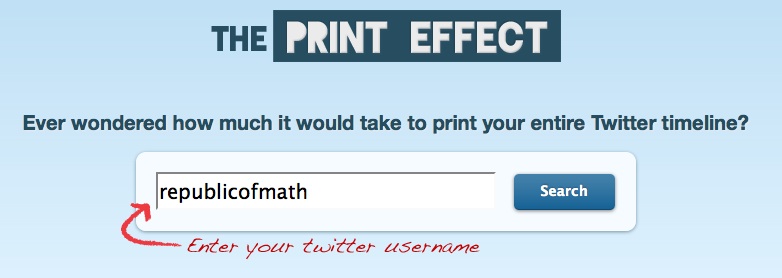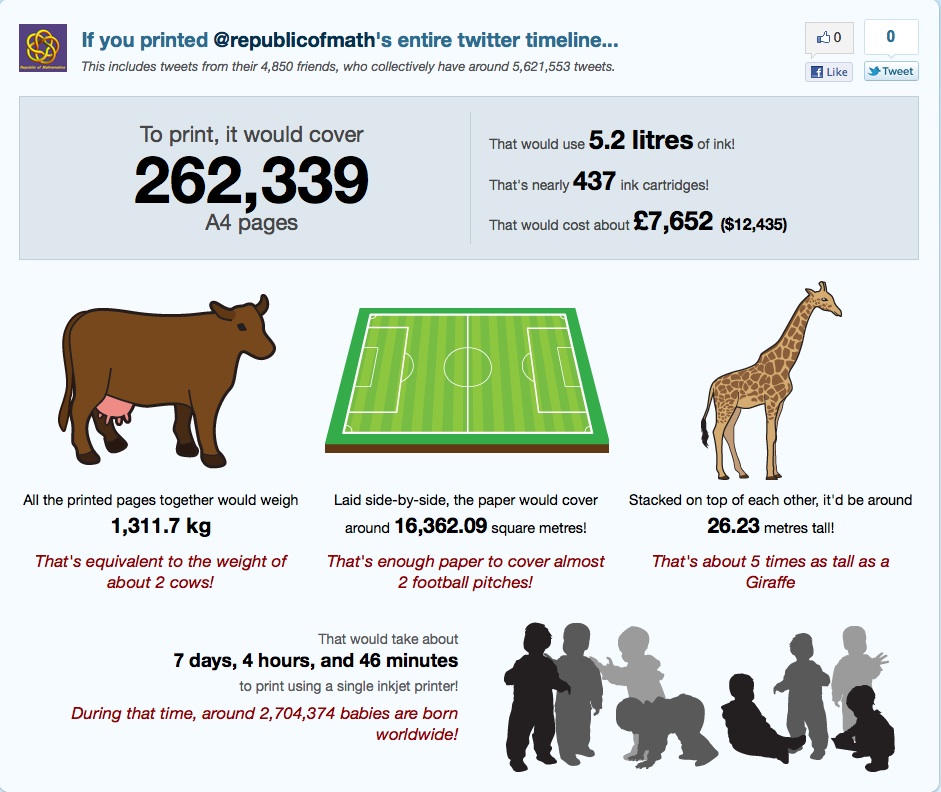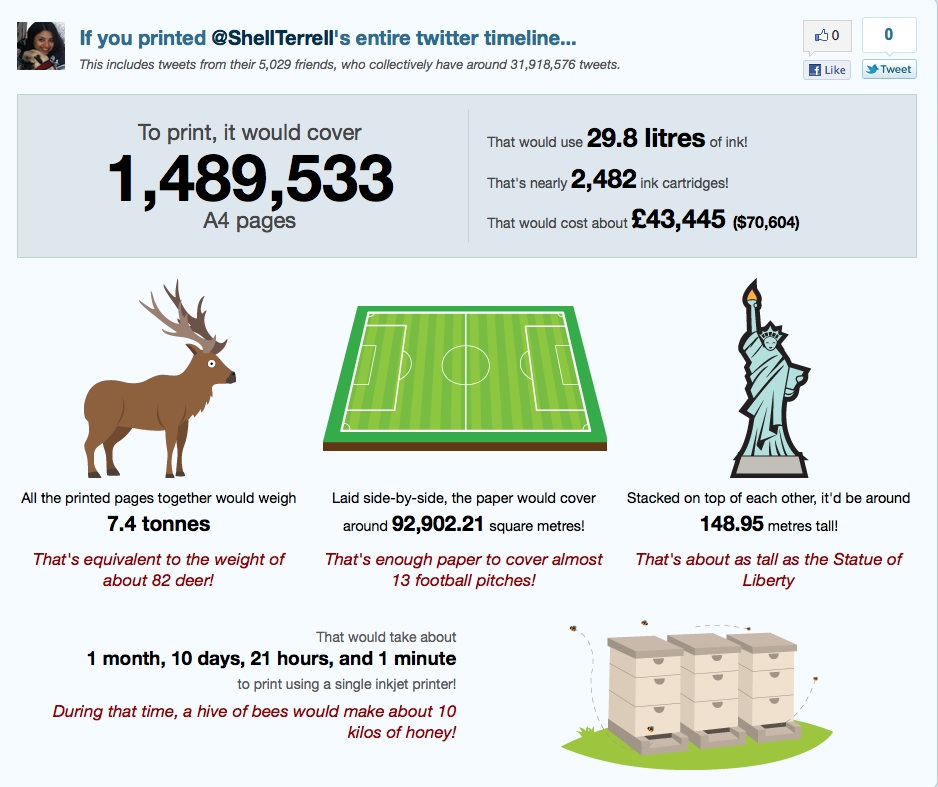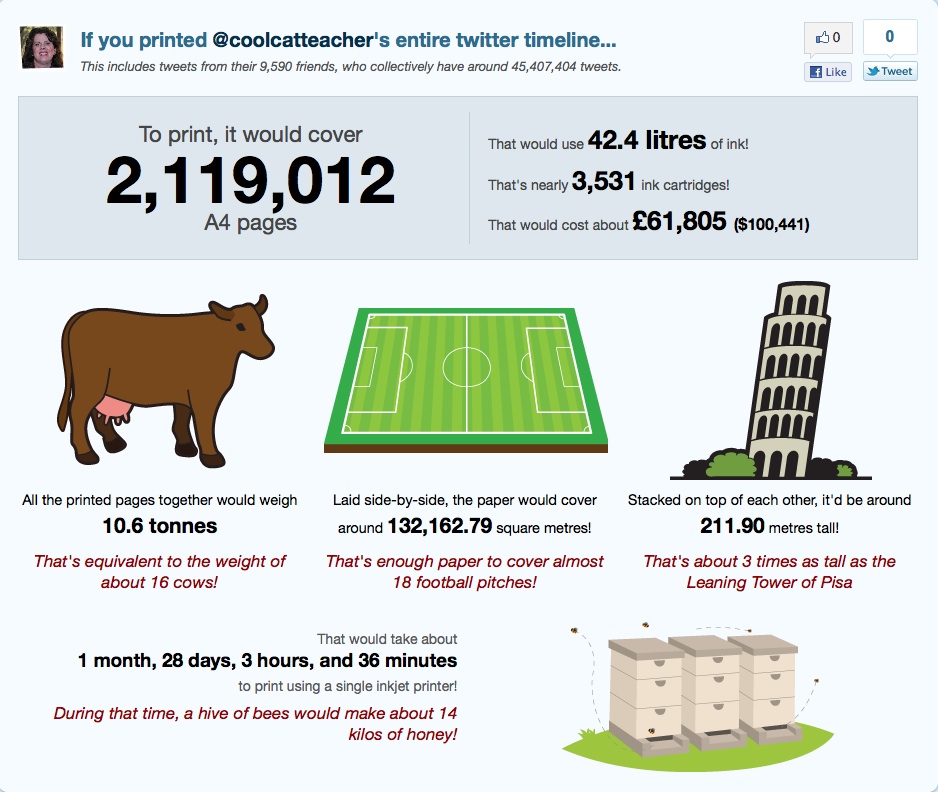Numeracy and Twitter
Posted by: Gary Ernest Davis on: March 31, 2011
This is a humorous post with a numeracy message that seems to be useful – especially for teachers.
The website The Print Effect will print out a bunch of graphics helping you visualize the output of your entire Twitter timeline, which means your Tweets and those of your friends.
Let’s suppose it’s @republicofmath we want to check up on Print Effect:
Print Effect gives us the following output:
This is a pretty neat graphic. If we believe the figure of 262,339 A4 pages is correct, the images give us a number of alternative ways of thinking about how large this number of pages really is.
These comparisons are what give meaning to abstract numbers, and allow kids (and some of us adults) better and more meaningful ways of relating the number to something else we have a feel for.
Well now it’s fun to look at some Twitter people we know and see how they do.
I know Shelly Terrell (@shellterrell) is a demon Tweeter so let’s see how she does on Print Effect:
Holy cow! Shelly and friend’s Twitter output is ginormous!
Another Twitter demon who’s been at it for a longer time is Vicki Davis (@coolcatteacher). Here’s Vicki and friends Twitter output:
Amazing! Three times the height of the leaning tower of Pisa!
I’m clearly going to have to try harder and get more productive friends (like Vicki) or both.
I think this could be a fun and instructive numeracy exercise for upper elementary and middle school kids (not to mention their teachers).
Enjoy!
The changing nature of textbook publishing
Posted by: Gary Ernest Davis on: March 28, 2011
 I was told some juicy information about academic textbook publishing last week.
I was told some juicy information about academic textbook publishing last week.
A sales representative of a major textbook publisher discussed the medium term plans of the company as it re-thinks its role in publishing.
We discussed the high price of calculus texts for students, a topic close to my heart.
The new calculus book, previously only published in hardcover, will now be available as a paperback for – wait for it! – a mere $150.
What a bargain!
Why do teachers of undergraduate mathematics, for example, keep using these highly priced texts?
Answer number one
Because they are too lazy to write their own texts.
What makes them averse to writing their own texts?
By and large it is forming the problem sets and answers.
Which brings us to:
Answer number two
Because the big publishers now have online grading systems that pass the pain of grading home-works and possibly tests, to an online system that records results, does statistics, offers students hints, allows multiple re-takes, allows access to the book online, and gives short video lessons on difficult topics, among other things.
This is a big plus for teachers: homework grading is, for a number of reasons, one of the most irksome parts of the job.
Anything that relieves an instructor of this chore has to be good.
But at $150 a student?
The price is so steep that many students simply do not buy the book, and forgo the homework contribution to their grade.
What’s new in textbook publishing?
The e-book version of some undergraduate texts is now modifiable by teachers.
Suppose you want to insert a video you found on You Tube or elsewhere into the online version of the book.
No problem, you can do it yourself.
Suppose you do not like the author’s explanation of a particular topic.
No problem, you can modify the text with your own version.
Very flexible, and very useful.
However the author and publisher still get paid, and you do not.
What’s on the horizon?
This is the juicy bit.
Publishers – some of the biggest – are re-inventing themselves as facilitators and managers of learning.
What they want you, the teacher, to do is specify your learning goals and learning outcomes, and they will map a path through various resources – text, videos, and software applications – that will help achieve your goal.
The “textbook” per se is on its way out.
In its place will be a multimedia learning environment, managed ny publishers.
Who wins and who loses?
Teachers win in this scenario, in my view, because they get access to a rich array of learning resources.
Students and parents lose, in my view, because this will cost a lot of money and many will not be able to afford it.
My guess is that educational technologists will be in great demand by academic publishers.
I guees, too, that “star” teachers, those who can really make a lesson pop, will be in demand as video performers for publishers.
I am betting on multi-million dollar contracts for outstanding teachers.
These are interesting times!
Postscript
Readers might like to take a look at the site:
ExpensiveTextbooksSuck. People coming together to defeat expensive textbook prices!




